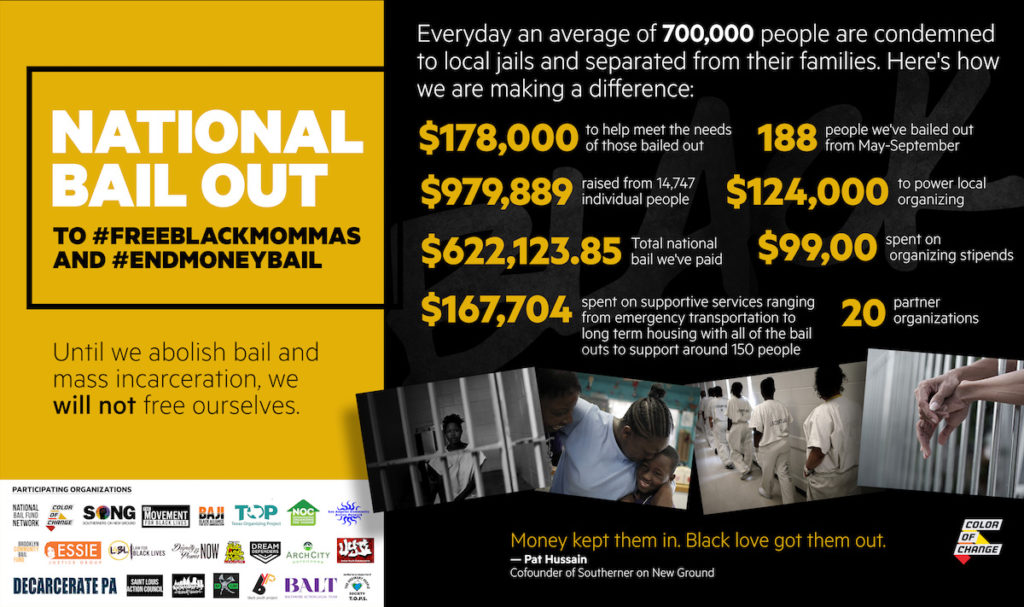Everyday an average of 700,000 people are condemned to local jails and separated from their families. A majority of them are there simply because they cannot afford to pay bail.
The organizations involved in the National Bail Out are working to end money bail and in the meantime get as many people out of cages and back to their families as we can.
Starting on Feb 14th – Black Love Day – organizations working to #EndMoneyBail and pretrial detention in Memphis, Philadelphia, Los Angeles, Alabama, and Texas will coordinate a month of Bail Outs in observance of Black History Month and International Women’s Month.
The Black Love Bail Out is an extension of the long struggle for Black freedom.
In the tradition of our enslaved Black ancestors, who used their collective resources to purchase each other’s freedom before slavery was abolished, until we abolish bail and mass incarceration, we will free ourselves though this community bail fund.
In preparation for our second annual Black Mamas Bail Out in May, the Black Love Bail Out will continue to bring attention to the impact of pre-trial detention and mass incarceration on Black people, and specifically black women and femmes and will feature the release of our toolkit as we invite more communities to join us.
Support the Black Love Bail Out by donating to the National Bail Out and sign up for Appolition and give your spare change.
Why do we do bail outs?
Everyday tens of thousands of people languish in jail simply because they cannot afford bail. In addition to the over $9 billion wasted to incarcerate people who have been convicted of no crime, pre-trial incarceration has catastrophic impacts on families and communities. Even a few days in jail can ruin a person’s life. They may lose their job, their family may lose housing and some even lose their children.
Since 1980, the number of incarcerated people has grown by 500%. Fed by a racist War on Drugs, that our current Attorney General Jeff Sessions is trying to resurrect, millions of people have been taken from their families.
Pre-trial incarceration has catastrophic impacts on our communities in particular. Black people are over two times more likely to be arrested and once arrested are twice as likely to be caged before trial.
Our LBGTQ and gender nonconforming family are targeted and caged at even more alarming rates, and once in jail are significantly more likely to be sexually and physically abused.
For instance, one in five transgender women have spent time in prison or jail and one in three of them reported being sexually assaulted while there.
What can you do?
We can buy their freedom and push against mass criminalization and modern bondage! A donation to the National Bail Fund funds getting someone out of jail or providing them with the help they need.
The great news is that most of the bail money is ultimately returned so your contribution can cycle through and support multiple Bail Outs.
Or make a consistent contribution by signing up for Appolition – the digital tool that allows you to give your spare change from purchases to National Bail Out.
What we have done so far…

Since May 2017 over 14,000 people have donated to the National Bail Fund, bringing nearly 200 people home to their families and communities, where they belong.
Thanks to your support organizers and community members in Oakland, Los Angeles, St. Petersburg, Montgomery, Memphis, Durham, Atlanta, Houston, New York City, Little Rock, Charlottesville, John Simon, Charlotte, Kinston, Birmingham, Baltimore, Philadelphia, St. Louis and the D.C. area welcomed community members home with love, support and offerings.
Now we are working hard to help our people get back on their feet. Because our cities and states invest in jails and cages instead of services or support many our people do not have the basic resources they need to take care of themselves or their families.
With your generosity, the National Bail Fund has been able to provide short-term housing, healthcare, transportation, drug treatment, and mental health services to those who need it.

